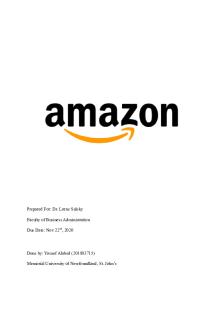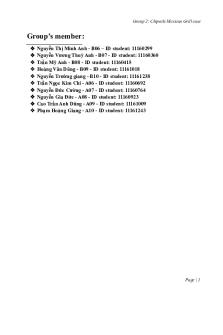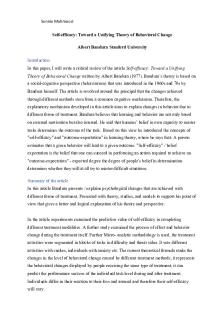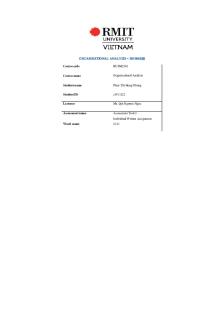Individual Assignment 2 by Sofea Nathriza Binti Abdullah 2020622536 PDF

| Title | Individual Assignment 2 by Sofea Nathriza Binti Abdullah 2020622536 |
|---|---|
| Author | Sofea Nathriza Abdullah |
| Course | Operation Management |
| Institution | Universiti Teknologi MARA |
| Pages | 4 |
| File Size | 195.7 KB |
| File Type | |
| Total Downloads | 130 |
| Total Views | 559 |
Summary
FACULTY OF BUSINESS AND MANAGEMENTBA242 - BACHELOR OF BUSINESS ADMINISTRATION (HONS.) FINANCETITLE: OPM 530 – DISCUSSION TOPIC͞Neǁ ǀirus in toǁn: Do ǁe really need to change ouroperations to give COVID-19 spaces?͟Prepared by:Sofea Nathriza binti Abdullah2020622536NBF3BPrepared for:Sir Saiful Azmir b...
Description
FACULTY OF BUSINESS AND MANAGEMENT BA242 - BACHELOR OF BUSINESS ADMINISTRATION (HONS.) FINANCE
TITLE: OPM 530 – DISCUSSION TOPIC
“New virus in town: Do we really need to change our operations to give COVID-19 spaces?” Prepared by: Sofea Nathriza binti Abdullah 2020622536 NBF3B
Prepared for: Sir Saiful Azmir bin Kasdi
Submission date: 5th January 2021
“New virus in town: Do we really need to change our operations to give COVID-19 spaces?” The COVID-19 pandemic in Malaysia is part of the ongoing worldwide pandemic of coronavirus disease 2019 (COVID-19) caused by severe acute respiratory syndrome coronavirus 2 (SARS-CoV-2). The virus was confirmed to have reached Malaysia in late January 2020, when it was detected on travelers from China arriving in Johor via Singapore on 25 January, following the outbreak of COVID-19 in Hubei, China. It has created a global health crisis that has had a deep impact on the way we perceive our world and our everyday lives. The crisis has been affecting our lives in overall including society, health, economic, and social life. The implication towards society in education and business has brought major changes in our daily routine and process. Government, education, and business segments are struggling to normalize the changes happening in such shocking moments. To adapt on the crisis happening in our country may take some time to brainstorm it just to make it work as before crisis. However, we can see that the chances for things to get back into normal are small. Thus, every segment must respond correspondingly to COVID-19 to get back on the track or to run until it works.
The government has responded to COVID-19 accordingly to protect the society and its country by implementing health guidelines, the market process and movement control order. The Ministry of Health played a crucial role in ensuring maximum readiness to contain the spread of the virus. Among the earliest efforts taken by the MoH to prevent disease transmission was the enforcement of health screening at all points of entry. According to the Director-General of the MoH Datuk Dr. Noor Hisham Abdullah, one of the strategies was the placement of thermal scanners. This was done to further enhance the detection of fever amongst tourists and/or locals returning from abroad. To enhance the MoH efforts in keeping the spread and mortality under control, a Movement Control Order (MCO) was implemented on March 18, 2020. The MCO related to the restriction of movement of people into or out of an area. With all due respect that government order to react from pandemic has brought significant changes to the daily process such as education and business system. In specific, new policies has been implemented in both segments bring adjustments that difficult for society to adapt on it.
To discuss on impacts on education, governments decided to temporarily close educational institutions to reduce the spread of COVID-19. Going to school is the best public policy tool available to raise skills. While school time can be fun and can raise social skills and social awareness, from an economic point of view the primary point of being in school is that it increases one ability. The closure of schools, colleges
and universities not only interrupts the teaching for students, but the closure also coincides with a key assessment period and many exams have been postponed or cancelled. In terms of access, the requirement to learn via the online platform would be to have internet and a device such as computer, laptop, tablet, or smartphone. In urban areas, there are complaints that children have to share devices and they could not fully utilize the lessons online due to slow internet connections or lack of devices. These issues that students experiencing is new and it may take time to adapt it in order to normalize it as part of new living. On the other hand, economic effects on business due to COVID-19 crisis has parted implication on business in financial, customer, supply chain and people itself. The challenges faced by business in financial issues include cashflow, liquidity, delays in receivables and declines in revenue, fall in demand due to customer afraid to spend on market as usual. Delays in receiving supplies as the main supply chain challenge, while SMEs noted delays in fulfillment and delivery as their major challenge and companies have faced downtime in their daily operations, while of SMEs have experienced delays in completing tasks and projects. The country’s economic growth has lowered down. It has almost shaken up all types of business, major retailers have temporarily shuttered their stores. Apart from that, the medium and small-sized retailers are combating with the situation due to low footfalls. Further, online businesses are also not out of the list they are also severely affected by COVID-19. Therefore, it is assumed that this deadly virus will severely impact the whole business in the long run. How are the society adjusting to this crisis? As we can see these implications on human capital, organizations, and society itself. Major changes are been applied and brought difficulties to adapt it. To discuss on the alteration applied, the government’s new rules and procedure are the significant effect on the changes. Change and uncertainty have strained employees physically, emotionally and financially. Even before COVID-19, employee emotional and financial well-being were top concerns for businesses. Now, as companies continue to adapt to changing pandemic conditions, workforce health, resilience and well-being are even more critical to sustaining operations with widespread stay-at-home orders, employers have adjusted, reduced or suspended operations and shifted workforces online, all of which have affected overall employee well-being. As companies begin to reimagine the new workplace, employee health and safety will continue to be crucial. The management on the different side, needs to reconsider strategies to get the revenue from ward off major losses that occur in early stage. Moreover, with the COVID-19 crisis fundamental changes in consumer behavior, supply chains, and routes to market are knocking companies off balance. Therefore, organization must need to respond it
by changing the operation to accelerate the adoption of agile ways of working and value chain transformation to help outmaneuver uncertainty. Becoming an Intelligent Enterprise means shifting from top-down decision-making, empowering teams guided by purpose, driven by data, powered by technology and enabled by cloud for faster speed to market. It calls for razing rigid structures and creating absorbent organization with modules that plug and play. The Intelligent Enterprise is capable of dynamic self-management and continual adaptation. It is built for responsiveness, resiliency, and growth. Education system are rapidly changing the basic way they do their work from travelling to school and face to face lecture and communication into everything in virtual such as online classes, online examination, and presentation. Many people believe that, students are the most effected people due to COVID-19 as they unable to study as usual and most likely to end up fail because reluctant to adapt the new situation changed. It almost like not schooling when studying at home just by using gadgets. Many of them opposed of paying school and institution as the lecture are not physically anymore. For me personally, it is not rational for opposing to paying fees as the lecturer only able to teach by online this will result a reduction of resources to transform the outputs which are students. The rules that have been enrolled by the government is to reduce COVID-19 cases as in school involve crowded people and physical contact among students. Education system changed it operation may take serious effect on the student, not to neglect the management of school or institution itself to produce excellent students who will serve the country later. The consequences will happen if the students do not able to cater to such changes. The management will always seek for strategy to improve their operation to adapt to this crisis situations by implementing new guidelines for student, the syllabus that suitable for the condition and the lecturer as a resource to create successful students. The question is, will the society and organization able to adapt the changes in their operation? Well, I can say it depends on one’s willingness. Since this COVID-19 issue has shockingly attack us, everyone is not ready to face it and it is very rare cases happen in long run. All organization, society and human capital affected to it, however since this issue has started early of the year 2020, we have already getting used to it and the changes operation in every segments are make sense to give COVID-19 spaces. To conclude that, I believe that one fine day everything will go back to normal although its not, we are all must admit that COVID-19 will live among us and we shall continue the operations and changing it when necessaries in order to run the country smoothly....
Similar Free PDFs

Report - Assignment 2 : Individual
- 11 Pages

Individual Assignment 2 MGT420
- 6 Pages

Assignment 2 - Individual Case Study
- 11 Pages

Individual Assignment
- 26 Pages

Individual Assignment
- 20 Pages

Individual assignment
- 5 Pages

Individual assignment
- 3 Pages
Popular Institutions
- Tinajero National High School - Annex
- Politeknik Caltex Riau
- Yokohama City University
- SGT University
- University of Al-Qadisiyah
- Divine Word College of Vigan
- Techniek College Rotterdam
- Universidade de Santiago
- Universiti Teknologi MARA Cawangan Johor Kampus Pasir Gudang
- Poltekkes Kemenkes Yogyakarta
- Baguio City National High School
- Colegio san marcos
- preparatoria uno
- Centro de Bachillerato Tecnológico Industrial y de Servicios No. 107
- Dalian Maritime University
- Quang Trung Secondary School
- Colegio Tecnológico en Informática
- Corporación Regional de Educación Superior
- Grupo CEDVA
- Dar Al Uloom University
- Centro de Estudios Preuniversitarios de la Universidad Nacional de Ingeniería
- 上智大学
- Aakash International School, Nuna Majara
- San Felipe Neri Catholic School
- Kang Chiao International School - New Taipei City
- Misamis Occidental National High School
- Institución Educativa Escuela Normal Juan Ladrilleros
- Kolehiyo ng Pantukan
- Batanes State College
- Instituto Continental
- Sekolah Menengah Kejuruan Kesehatan Kaltara (Tarakan)
- Colegio de La Inmaculada Concepcion - Cebu








